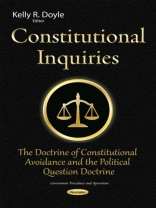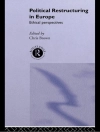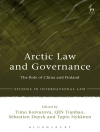Article III of the Constitution established the judicial branch of the United States, consisting of the Supreme Court and of any "inferior Courts as the Congress may from time to time ordain and establish…. " To staff such courts, the Constitution empowered life-tenured and salary-protected judges to adjudicate certain "cases" or "controversies, " including cases arising under the Constitution. The Supreme Court, in Marbury v. Madison, held that the judicial power to interpret the Constitution necessarily includes the power of judicial review-that is, the power to countermand the decisions by other government agents because a given decision contravenes the Constitution. The Supreme Court has established a host of loosely related rules generally called the constitutional avoidance doctrine that discourage a federal court from issuing broad rulings on matters of constitutional law. After providing general background on the power of judicial review and the major theories on the constitutional avoidance doctrine, this book explores the various rules that allow a court to avoid a ruling that invalidates a democratically enacted law and the logic behind those rules. This book provides an exploration of how the doctrine of constitutional avoidance has influenced some of the recent jurisprudence of the Roberts Court, criticisms of the doctrine, and the implications for Congress. The book also discusses the justiciability and the separation of powers in the political question doctrine, which the Supreme Court has articulated to restrict when federal courts will adjudicate disputes.
Kelly R Doyle
Constitutional Inquiries [PDF ebook]
The Doctrine of Constitutional Avoidance and the Political Question Doctrine
Constitutional Inquiries [PDF ebook]
The Doctrine of Constitutional Avoidance and the Political Question Doctrine
购买此电子书可免费获赠一本!
格式 PDF ● 网页 90 ● ISBN 9781634829281 ● 编辑 Kelly R Doyle ● 出版者 Nova Science Publishers ● 发布时间 2015 ● 下载 3 时 ● 货币 EUR ● ID 7225807 ● 复制保护 Adobe DRM
需要具备DRM功能的电子书阅读器












